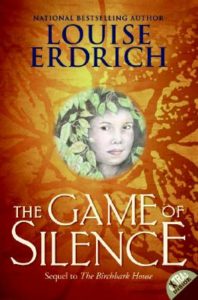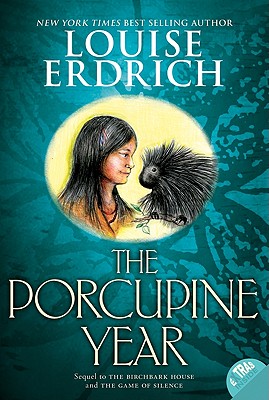 Her name is Omakayas, or Little Frog, because her first step was a hop, and she lives on an island in Lake Superior. It is 1850, and the lives of the Ojibwe have returned to a familiar rhythm: they build their birchbark houses in the summer, go to the ricing camps in the fall to harvest and feast, and move to their cozy cedar log cabins near the town of LaPointe before the first snows.
Her name is Omakayas, or Little Frog, because her first step was a hop, and she lives on an island in Lake Superior. It is 1850, and the lives of the Ojibwe have returned to a familiar rhythm: they build their birchbark houses in the summer, go to the ricing camps in the fall to harvest and feast, and move to their cozy cedar log cabins near the town of LaPointe before the first snows.
The satisfying routines of Omakayas’s days are interrupted by a surprise visit from a group of desperate and mysterious people. From them, she learns that all their lives may drastically change. The chimookomanag, or white people, want Omakayas and her people to leave their island in Lake Superior and move farther west. Omakayas realizes that something so valuable, so important that she never knew she had it in the first place, is in danger: Her home. Her way of life.
In this captivating sequel to National Book Award nominee The Birchbark House, Louise Erdrich continues the story of Omakayas and her family. [Publisher’s description.]
ISBN: 9780064410298 | Harper Collins
Awards
- Scott O’Dell Award for Historical Fiction
- ALA Notable Children’s Book
- Kirkus Editor’s Choice
- ALA Booklist Editors’ Choice
- Horn Book Fanfare
- New York Times Notable
Reviews
“Like its predecessor The Birchbark House (1999), this long-awaited sequel is framed by catastrophe, but the core of the story, which is set in 1850, is white settlers’ threats to the traditional Ojibwe way of life. Omakayas is now nine and living at her beautiful island home in Lake Superior. But whites want Ojibwe off the island: Where will they go? In addition to an abundance of details about life through the seasons, Erdrich deals with the wider meaning of family and Omakayas’ coming-of-age on a vision quest. Just on the edge of the child’s daily life and coming ever closer are the whites–among them, a Catholic “soul-stealer” priest and a friendly teacher who helps the children learn to read and write both Ojibwe and English so that they can confront cheating white agents. Readers familiar with the first book will welcome the return of several richly drawn nonreverential characters, including Omakayas’ pesky brother, her irritable mom, and her bold, tough mentor, Old Tallow. As Erdrich said in the Booklist Story Behind the Story, “Little House on the Lake” [BKL Ap 1 99], about The Birchbark House, her research into her ancestors revealed the horrifying history and also a culture rich, funny, and warm. In this heartrending novel the sense of what was lost is overwhelming.” —Hazel Rochman, Booklist, ALA
“In the early 1930’s, Rose Wilder Lane, a journalist and an editor, persuaded her mother, Laura Ingalls Wilder, to chronicle her childhood in a pioneering family of the 1860’s and 70’s. The result — the legendary ”Little House” series — has introduced millions of children to the story of settlers pushing their way across the middle of a continent, working hard and enduring much to settle a ‘new’ land. The books’ endurance is almost as astonishing as that of the pioneers. The original nine titles, translated into some 40 languages, are still widely read and loved. Now Louise Erdrich, the author of many acclaimed books for both adults and children, has embarked on a series nearly parallel to Wilder’s and for the same audience of middle grade readers, but told from an altogether different angle. Drawing on her Ojibwe heritage and historical research, she has begun to tell the life story of Omakayas, a girl growing up in a small Ojibwe community in Minnesota in the 1840’s and 50’s. It is the story of a people who were in America before the white settlers came and who were driven from their homeland by the newcomers.” —New York Times | Read full review.
“Memorable.” —Chicago Tribune
“Full of humor, richness and heart.” —Wisconsin State Journal









Twitter
Google plus
LinkedIn